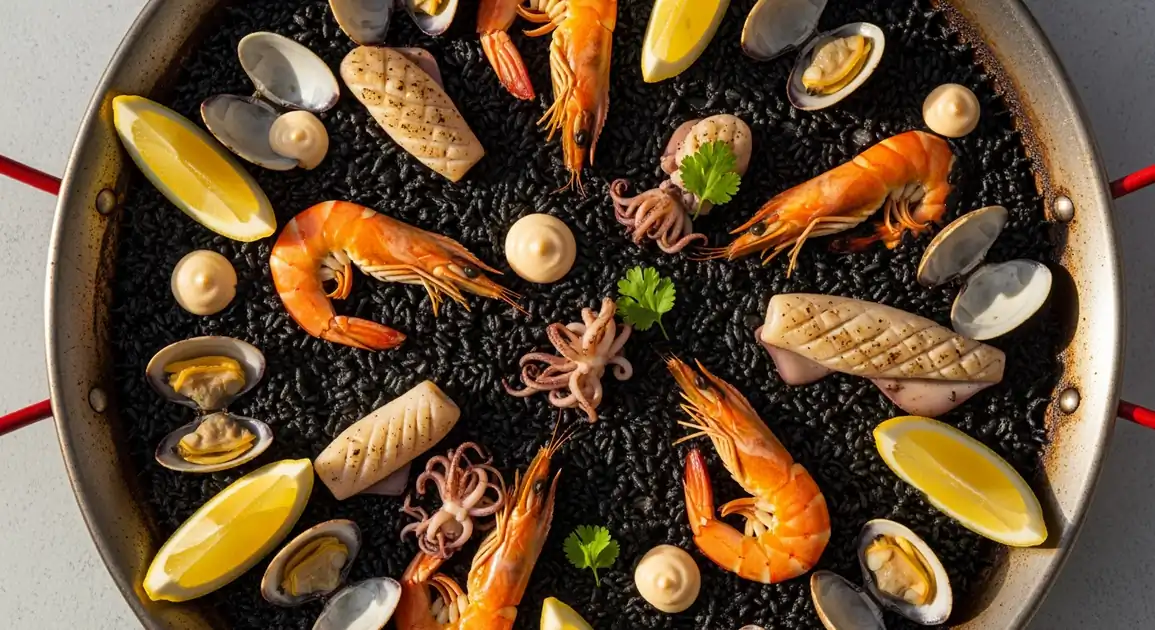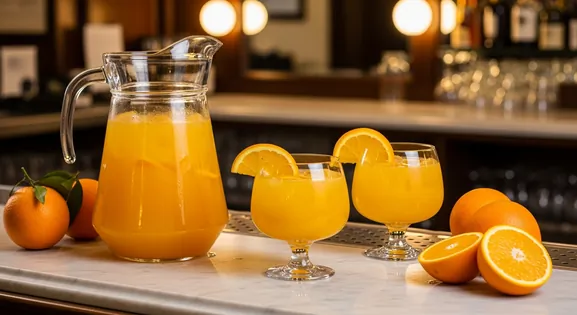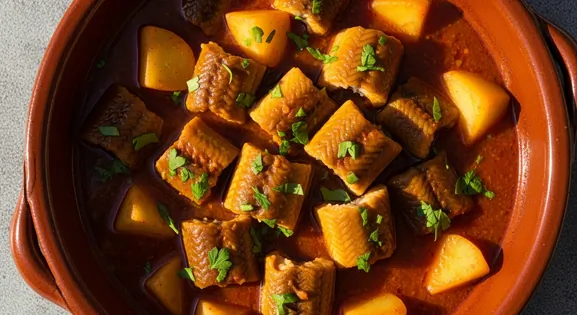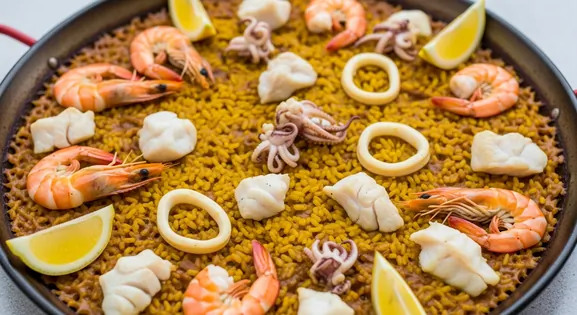Arroz Negro (Black Rice) in Valencia
Arroz Negro

A Guide to the Local Experience
Beyond paella, Valencia's Arroz Negro offers a deep dive into the city's coastal heritage. Imagine savoring this intensely flavorful black rice, rich with local seafood and squid ink, right where it was perfected. It's a culinary journey unique to this vibrant Mediterranean city.
New to Arroz Negro (Black Rice)? Learn all about its history in our complete guide.
Insider Tips for Arroz Negro (Black Rice)
Head to the historic fishermen's quarter, El Cabanyal, for the most authentic Arroz Negro. Restaurants here often use traditional recipes and fresh catch from the nearby port.
Arroz Negro is primarily a lunch dish in Valencia, especially on weekends. Many top 'arrocerías' (rice restaurants) only serve it from 2 PM to 4 PM. Plan accordingly.
Authentic Arroz Negro is always served with a dollop of creamy, house-made alioli. It's not just a condiment; it's an essential part of the flavor profile, adding a tangy, garlicky counterpoint.
A Guide to Finding Arroz Negro (Black Rice)
El Cabanyal / El Grao
The historic fishermen's quarter offers authentic seafood restaurants with traditional recipes passed down through generations.
Marina Beach, Port area, Lonja del Pescado (Fish Market)
Lunch (2 PM - 4 PM)
La Malvarrosa Beach
Beachfront restaurants specializing in rice dishes, offering sea views and fresh seafood.
Malvarrosa Beach promenade, Patacona Beach
Lunch (2 PM - 4 PM), Weekend afternoons
City Center / Carmen
Traditional and modern restaurants in the historic center offering Arroz Negro to visitors wanting to try Valencia's rice tradition.
Mercado Central, Plaza de la Reina, Cathedral area
Lunch (2 PM - 4 PM), Dinner (8:30 PM - 11 PM)
Albufera Natural Park
Restaurants near this rice-growing region specialize in authentic rice dishes using local bomba rice.
El Palmar village, Albufera lake
Lunch (2 PM - 4 PM)
Vendor Tips
- Look for restaurants displaying the 'D.O. Arroz de Valencia' certification, indicating use of local rice varieties.
- Reservations are essential for popular rice restaurants, especially on Sundays.
- Ask if they use 'arroz bomba,' the premium local rice variety ideal for absorption cooking methods.
- Traditional restaurants often only serve rice dishes for lunch, not dinner.
A Traveler's Checklist
What to Look For
-
Distinctive, deep black color from natural squid ink, not greyish or dull.
Authentic color indicates sufficient squid ink. A dull color might mean less ink or lower quality ingredients.
-
Served in a traditional paellera with a minimum 2-person order.
Common practice in quality Valencian 'arrocerías', suggesting fresh preparation per order, especially near the port or Albufera area.
-
Pleasant sea aroma, not overly 'fishy'.
Fresh seafood and squid ink should smell subtly of the sea; strong fishiness indicates older ingredients.
-
Creamy, house-made alioli served alongside.
A standard accompaniment in Valencia; fresh alioli suggests attention to detail.
What to avoid
-
Served instantly or under 20 minutes.
Signifies pre-cooked rice, a safety and quality concern, especially prevalent in tourist traps around Plaza de la Reina.
-
Greyish or pale black appearance.
May indicate insufficient squid ink or use of artificial coloring, affecting authenticity and flavor.
-
Strong ammonia or overly fishy smell.
Indicates spoiled seafood or low-quality ingredients. Do not eat.
-
Watery or separated alioli.
Suggests poorly made or old alioli, a potential hygiene risk if containing raw egg.
Know Before You Go
Dietary Information
Important Note for Travelers: Your safety is our priority. Below are the common allergens associated with the traditional preparation of this dish. However, recipes and ingredients can vary significantly between establishments. Always confirm all ingredients directly with the food vendor before ordering, especially if you have a severe allergy.
Potential Allergens
Dietary Suitability
Price Guide
Budget Tips
- Traditional restaurants in El Cabanyal (the old fishermen's quarter) often offer excellent Arroz Negro at better prices (14-20 EUR per person).
- Look for 'menu del día' options that sometimes include Arroz Negro, especially on weekdays (12-18 EUR for multiple courses).
- Restaurants in La Malvarrosa beach area charge premium prices during high season (20-28 EUR per person).
- Most restaurants require minimum 2 portions per order, so bring a dining companion to share costs.
Serving & Seasonality
In Valencia, Arroz Negro is almost always served in the traditional wide, shallow pan it was cooked in. Alioli is served separately in a small dish, and fresh lemon wedges accompany the rice. Many traditional restaurants place the pan on a stand in the center of the table.Best Times to Enjoy
- Lunch: The traditional time for rice dishes in Valencia, especially from 2 PM - 4 PM. Many traditional restaurants only serve rice dishes at lunch.
- Sunday Lunch: Sunday afternoon (2 PM - 4 PM) is the most traditional time for Valencianos to enjoy rice dishes with family.
- Dinner: Tourist-oriented restaurants and modern establishments serve Arroz Negro during dinner hours (8:30 PM onwards).
Seasonal Availability
Available year-round, with particularly good quality in late spring and summer when local seafood is at its peak.
Ordering Like a Local
When ordering Arroz Negro in Valencia, remember it's typically prepared for a minimum of two people, so it's a communal dish. Always ask if they use "arroz bomba," the preferred local rice. Expect a wait of 20-30 minutes as it's cooked fresh to order. Don't be shy to ask for extra alioli, and remember that rice dishes are traditionally eaten for lunch, especially on Sundays.
Local Styles of Arroz Negro (Black Rice)
Arroz Negro del Senyoret
A 'gentleman's version' where seafood is peeled and cleaned before cooking, allowing diners to enjoy without getting their hands dirty - particularly popular in upscale Valencian restaurants.
Arroz Negro Meloso Valenciano
A creamier Valencian style with slightly more stock, creating a consistency between traditional paella and risotto.
Arroz Negro con Verduras
A modern variation incorporating traditional Valencian vegetables like artichokes and green beans alongside the seafood.
Arroz Negro de Albufera
Specific to restaurants near the Albufera nature reserve, using local bomba rice and sometimes incorporating eels or duck from the wetlands alongside seafood.
Culture and Customs
Local Significance
In Valencia, rice dishes are a cornerstone of local identity and pride. While paella valenciana is the most famous, Arroz Negro represents the coastal culinary tradition and the region's connection to the Mediterranean. Valencians take their rice very seriously and judge restaurants heavily on their rice preparation techniques.
Eating Customs
- Allow the rice to rest 1-2 minutes when it arrives at the table before serving.
- In Valencia, diners typically eat directly from the communal pan, each person eating from the section nearest to them.
- The socarrat (crispy bottom) is highly prized and fairly shared among diners.
- Accompany with local Valencian white wines like those from Utiel-Requena or Rueda.
Mastering the Experience
Choosing an Arrocería for Arroz Negro in Valencia
Choose an Arrocería for Arroz Negro in Valencia.
- Prioritize restaurants listed as 'Arrocería' or those specializing in 'Arroces'.
- Look for venues popular with locals, especially during weekday lunchtimes (1:30 PM - 4 PM).
- Check reviews specifically mentioning 'Arroz Negro' quality, focusing on those near the port or El Saler for seafood freshness.
- Confirm the minimum order is for two people and expect a 20-30 minute wait.
- Observe nearby tables – are the paelleras wide and shallow? Is the rice intensely black?
Confirming Authentic Arroz Negro Preparation
Confirm authentic Arroz Negro preparation.
- Ask if the dish is made 'al momento' (cooked to order).
- Look for the presence of small pieces of squid or cuttlefish within the rice.
- Verify the deep black color comes from 'tinta de calamar' (squid ink).
- Ensure it's served in a proper paellera, ideally with some 'socarrat' (crispy bottom layer).
- Check that fresh alioli and lemon wedges are provided.
Our Commitment to Quality
At Tasteplorers, our mission is to provide the most accurate and useful travel information in the world. To achieve this, all content on this site is created through our unique editorial framework. We utilize leading AI research tools, guided by our proprietary prompts, and a multi-stage validation process. This entire system is overseen by our editorial team to ensure everything we publish meets our high standards for accuracy, cultural nuance, and practical value for travelers.
Learn more about our Editorial Process and our Mission.
Countries
Explore regions
Europe
Discover Europe's diverse culinary landscape, from Mediterranean flavors to hearty Alpine fare. Learn to navigate markets, decode menus, and eat like a local.
Latin America & Caribbean
Discover the vibrant cuisines of Latin America & the Caribbean. Our expert guide covers everything from Mexican street food to Peruvian ceviche and market tips.
Oceania
Explore Oceania's diverse food scene. Learn about Polynesian earth ovens, Fijian feasts, and the vibrant café culture of Australia and New Zealand.
Southeast Asia
Explore Southeast Asia's diverse food cultures from Thailand to Vietnam. Get expert tips on navigating spice levels, choosing quality vendors, and understanding the rich traditions of the region.


